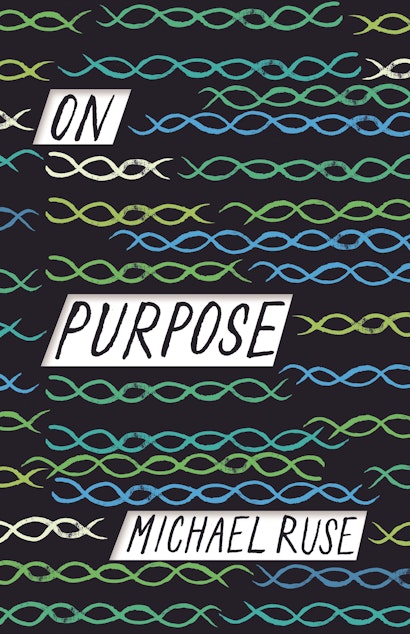Can we live without the idea of purpose? Should we even try to? Kant thought we were stuck with purpose, and even Darwin’s theory of natural selection, which profoundly shook the idea, was unable to kill it. Indeed, teleological explanation—what Aristotle called understanding in terms of “final causes”—seems to be making a comeback today, as both religious proponents of intelligent design and some prominent secular philosophers argue that any explanation of life without the idea of purpose is missing something essential.
In On Purpose, Michael Ruse explores the history of the idea of purpose in philosophical, religious, scientific, and historical thought, from ancient Greece to the present. Accessibly written and filled with literary and other examples, the book examines “purpose” thinking in the natural and human world. It shows how three ideas about purpose have been at the heart of Western thought for more than two thousand years. In the Platonic view, purpose results from the planning of a human or divine being; in the Aristotelian, purpose stems from a tendency or principle of order in the natural world; and in the Kantian, purpose is essentially heuristic, or something to be discovered, an idea given substance by Darwin’s theory of evolution through natural selection.
On Purpose traces the profound and fascinating implications of these ways of thinking about purpose. Along the way, it takes up tough questions about the purpose of life and whether it’s possible to have meaning without purpose, revealing that purpose is still a vital and pressing issue.
"While the topic can get swamped in jargon, Michael Ruse, a professor of philosophy at Florida State University, is anything but a dry writer. In On Purpose, he revels in the arguments that philosophers, scientists and religious saints have had over ‘the big picture’ for the past 2,000 years. . . . Taking his cue from his own Quaker upbringing, [Ruse] argues that three things remain deeply satisfying in life, even if philosophically one ends up on the side of Epicurus and his denial of design: family; a life of service to others; and, not surprisingly for a philosopher, the life of the mind. For many people, there is indeed purpose in each of these, and perhaps, Mr. Ruse suggests, that is enough."—John Farrell, Wall Street Journal
"Philosopher and perennial defender of evolution Ruse takes readers on a historical and constructive tour through one of the most importunate issues in basic metaphysics: is there any purpose behind the things—the universe, humans, nature, et al.—that are, and, if so, what is its nature and where does it come from? . . . As always, Ruse defends evolutionary science while valuing the beauty and expressiveness of human culture."—Library Journal
"A deeply intelligent book that treats key thinkers in philosophy, religion and the sciences fairly, humorously and with a virtuosity reflecting more than half a century in the field."—Paul Biegler, Cosmos
"On Purpose is a book that represents Ruse at his most wide-ranging and engaging. . . . [He] is akin to the most enthusiastic and entertaining tour guide one could have through an already compelling exhibit at a museum."—Mark E. Borrello, Quarterly Review of Biology
"On Purpose works both as an introductory text as well as a philosophical testament. . . . A book where one learns about the history of philosophy and the history of science, but not neutrally so, since one is looking through the eyes of one of the most active participants in recent debates."—Hugh Desmond, Science & Education
"Do humans have purposes and values? Michael Ruse, after ‘a lifetime's quest for understanding,' concludes ‘yes.' In this book, he journeys from Plato and Aristotle, through St. Augustine and Kant, to Darwin. The exploration is scholarly and profound, as well as eminently readable. There is much to learn from On Purpose and much to relish while reading it."—Francisco J. Ayala, University of California, Irvine
"There are no other books on the story of purpose in Western thinking that have such a broad, comprehensive, and historical approach. Michael Ruse probably knows this subject better than anyone else. He is always clear-eyed, and his writing is unique—conversational, personal, and irreverent."—Richard Richards, University of Alabama


